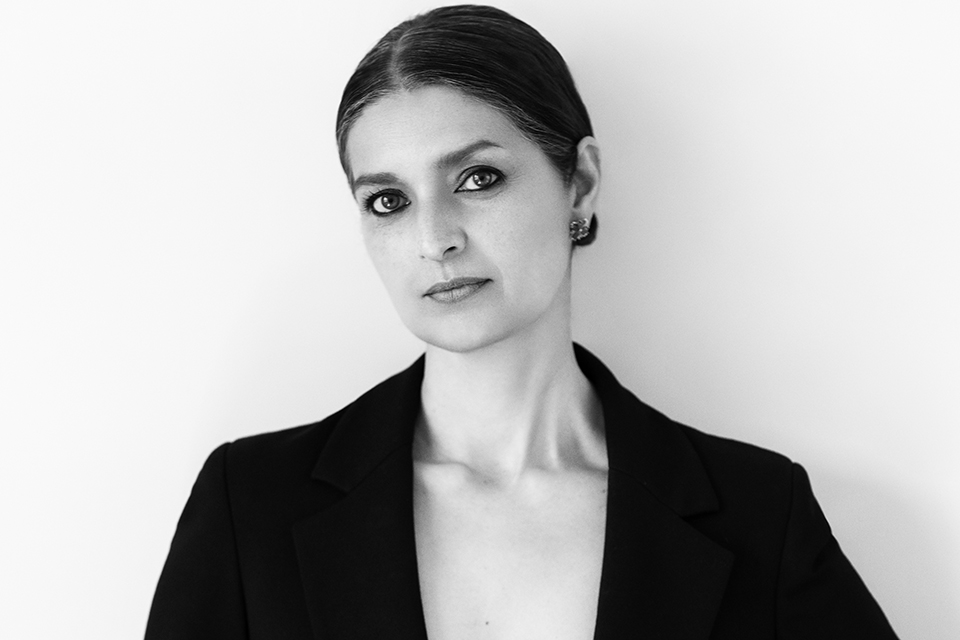Jhumpa Lahiri to Receive the 2026 St. Louis Literary Award
ST. LOUIS – Pulitzer Prize-winning author Jhumpa Lahiri will receive the 2026 St. Louis Literary Award from Saint Louis University. Lahiri will come to St. Louis in April 2026 to accept the award.

Jhumpa Lahiri. Photo by Laura Sciacovelli.
“The St. Louis Literary Award selection committee is thrilled to select Jhumpa Lahiri as the 58th award recipient. The Award’s mission, in part, is to celebrate writers whose work enhances our understanding of the human condition, and we believe will resonate long into the future,” said Edward Ibur, St. Louis Literary Award executive director. “Lahiri’s essays, translated works, and fiction reveal a writer who adeptly explores identity, cultural dislocation, and the immigrant experience. Lahiri also knows how to flat-out tell a great story that keeps the reader turning the pages and leaves an indelible impression long after the story ends.”
Lahiri is the author of the novels “The Namesake,” “The Lowland,” and “In Altre Parole,” among others. She also wrote the short story collections “Interpreter of Maladies” and “Unaccustomed Earth,” and she is the author of poetry and the non-fiction “The Clothing of Books” and “Translating Myself and Others.”
She received the Pulitzer Prize in 2000 for “Interpreter of Maladies,” her debut story collection which explores issues of love and identity among immigrants and cultural transplants. The novel “The Namesake” was named a New York Times Notable Book and Los Angeles Times Book Prize finalist. A film version, directed by Mira Nair, was released in 2007.
“Unaccustomed Earth” received the 2008 Frank O’Connor International Short Story Award and was a finalist for the Story Prize. Her book, “The Lowland,” won the DSC award for South Asian fiction and was a finalist for both the Man Booker Prize and the National Book Award in fiction.
“Jhumpa Lahiri's career, one that spans the Pulitzer Prize-winning “Interpreter of Maladies” to “The Namesake,” “The Lowland,” and her growing body of critically well-received translations, often showcase the nuances of language, belonging, and ultimately— transformation,” Ibur said. “We are thrilled to welcome Jhumpa Lahiri into our esteemed class of exceptional writers from around the globe who have received this Award over the years, including Chinua Achebe, Margaret Atwood, Seamus Heaney, Mario Vargas Llosa, Zadie Smith, Tennessee Williams and Joan Didion.”
Born in London, Lahiri moved to Rhode Island as a young child with her Bengali parents. She is a graduate of Barnard College and has a Ph.D. in Renaissance Studies from Boston University.
In 2014, Lahiri was awarded the prestigious National Humanities Medal. As well as the Pulitzer Prize, Lahiri has been awarded the PEN/Hemingway Award, an O. Henry Prize, the Addison Metcalf Award from the American Academy of Arts and Letters, the Vallombrosa Von Rezzori Prize, the Asian American Literary Award, the PEN/Malamud Award for Excellence in the Short Story and in 2024 she was elected to the American Academy of Arts and Sciences. Lahiri received a Guggenheim Fellowship in 2002 and a National Endowment for the Arts Fellowship in 2006.
Previously, she was the director of Princeton University’s Program in Creative Writing. She is now the Millicent C. McIntosh Professor of English and Director of Creative Writing at Barnard College, Columbia University. She was named a Commander of the Italian Republic in 2019 by President Sergio Mattarella.
St. Louis Literary Award
The St. Louis Literary Award is presented annually by Saint Louis University and has become one of the top literary prizes in the country. The award honors a writer who deepens our insight into the human condition and expands the scope of our compassion. Some of the most influential writers of the 20th and 21st centuries have come to Saint Louis University to accept the honor, including Margaret Atwood, Salmon Rushdie, Eudora Welty, John Updike, Saul Bellow, August Wilson, Stephen Sondheim, Zadie Smith and Tom Wolfe.
Saint Louis University
Founded in 1818, Saint Louis University is one of the nation’s oldest and most prestigious Catholic institutions. Rooted in Jesuit values and its pioneering history as the first university west of the Mississippi River, SLU offers more than 13,500 students a rigorous, transformative education of the whole person. At the core of the University’s diverse community of scholars is SLU’s service-focused mission, which challenges and prepares students to make the world a better, more just place.
Latest Newslink
- SLU Welcomes 175 New Medical Students at White Coat CeremonySaint Louis University’s School of Medicine marked a pivotal milestone for 175 incoming medical students at its annual White Coat Ceremony. On Sunday, July 27, faculty, family, and friends convened at St. Francis Xavier College Church to honor the students' achievements and their forthcoming pledge to the medical profession.
- Saint Louis University Hosts National Jesuit Student Leadership ConferenceSaint Louis University hosted student government leaders from Jesuit colleges and universities on campus July 22-26. This was the first time SLU hosted the National Jesuit Student Leadership Conference.
- James Hitchcock, Ph.D.: 1938-2025James F. Hitchcock, Ph.D., professor emeritus of history, died Monday, July 14, 2025. He was 87. Hitchcock authored several books on the history of the Catholic Church.
- Lentine Receives Award of Merit for Outstanding Contributions to Scientific MedicineKrista Lentine, M.D., Ph.D., professor of medicine at Saint Louis University's School of Medicine, is the 2024 recipient of the St. Louis Metropolitan Medicine Society Award of Merit for Outstanding Contributions to Scientific Medicine.
- We Should Treat More People with Hepatitis B, SLU Expert SaysIn a pair of articles published in Lancet Gastroenterology and Hepatology, scientists lay out the case for why we should expand treatment recommendations for people with hepatitis B.
- Running Interference: Scientists Block Viral RNA, Aim to Cure Hepatitis BIn a recent paper published in Science Translational Medicine, a SLU scientist reports that a class of drugs called RNA interference (RNAi) therapeutics represent a major advancement in the treatment of chronic hepatitis B virus infections.













